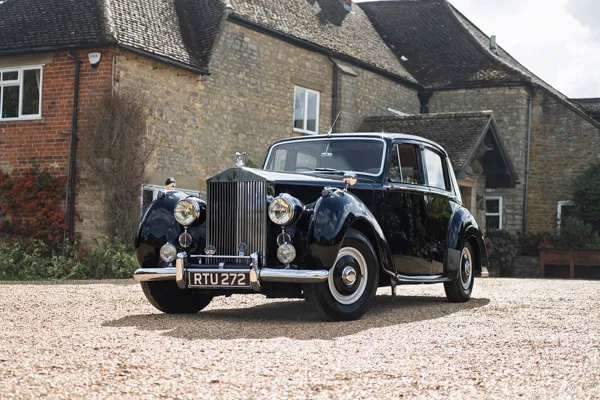Winter Car Storage: Supercar, Hybrid & EV Best Practice (UK Guide)
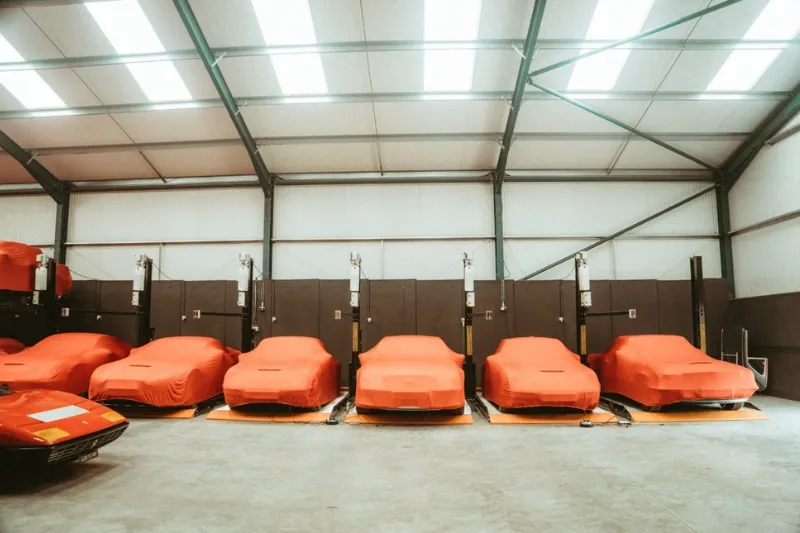
Car Storage
October 3, 2025
Start here: Winter Car Storage · Dehumidified Car Storage · For high-value cars see our: Supercar Storage
Why winter punishes stored cars (and how to stop it)
Batteries first. Cold reduces available cranking power and any parasitic draw from alarms or telematics will flatten a battery more quickly in winter. Use a smart conditioner set to the right chemistry: many supercars use AGM or lithium 12-volt systems, classics are often lead-acid. Match the mode, keep cable routing tidy, and avoid bargain “always on” trickle units.
Tyres next. Air contracts in cold weather, so pressures drop. Leave a performance tyre under-inflated for weeks and you invite flat-spotting. Set storage PSI, keep a short movement/shuffle routine, and for longer winter lay-ups place the car on tyre cushions to spread load evenly. See our guide: Which tyre cushions for car storage?
Salt and moisture. Winter roads shed brine and grit that cling to wheel arches, brake hardware and chassis seams. Put a salty car away wet and corrosion works while you sleep. If you must drive between frosts, wash thoroughly before you park up, including arches and the underside, then let the car dry fully in a dehumidified bay.
Condensation and mould. A cold, damp garage traps moisture. Interiors suffer first: leather, stitching and carpets. A controlled environment removes moisture from the air, so you are not fighting fogged glass and musty smells. Keep the interior dry, remove wet mats, and only use a breathable cover once the car is completely dry.
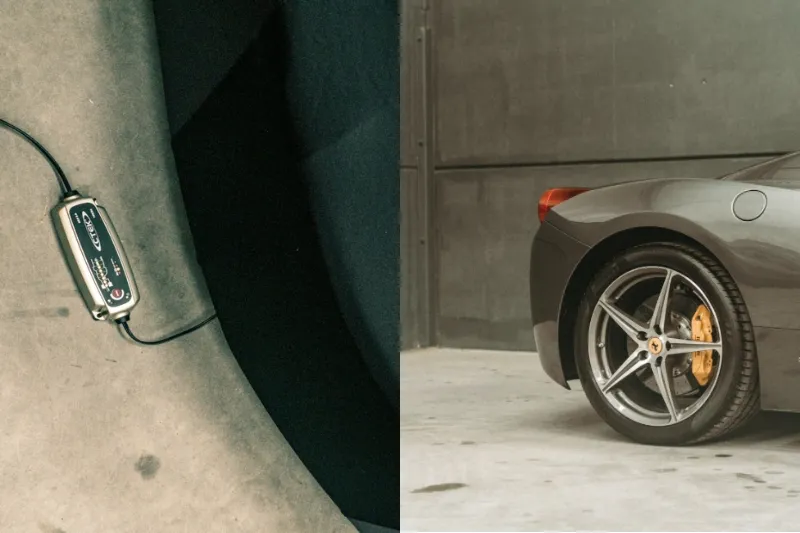
Supercar-specific winter notes
Splitter-safe access. Plastics and rubbers are less forgiving in the cold. Supercars need low-angle ramps, wheel dollies where appropriate, and trained handlers who move slowly and communicate.
Battery chemistry and soft wake-up. Many modern supercars need AGM or lithium profiles and a soft wake-up so ECUs and body modules come up cleanly after a long sleep. It is a small step that pays off in reliability.
Tyres and compounds. Wide, soft tyres are more prone to flat-spotting in winter. Correct pressures plus periodic movement are the big wins. Tyre cushions are a helpful addition for long rests.
Carbon-ceramic brakes. They do not rust like iron discs, but good practice still applies: car away clean and dry, no long handbrake parking, and a simple movement log to avoid pad imprint.
Discretion and keyless theft. Winter nights are long. We store keys in Faraday pouches or boxes, keep them away from vehicles, and maintain controlled access with movement logs. If you want keyless functions disabled, we can arrange that at Auto Classica.
Learn more: Supercar Storage
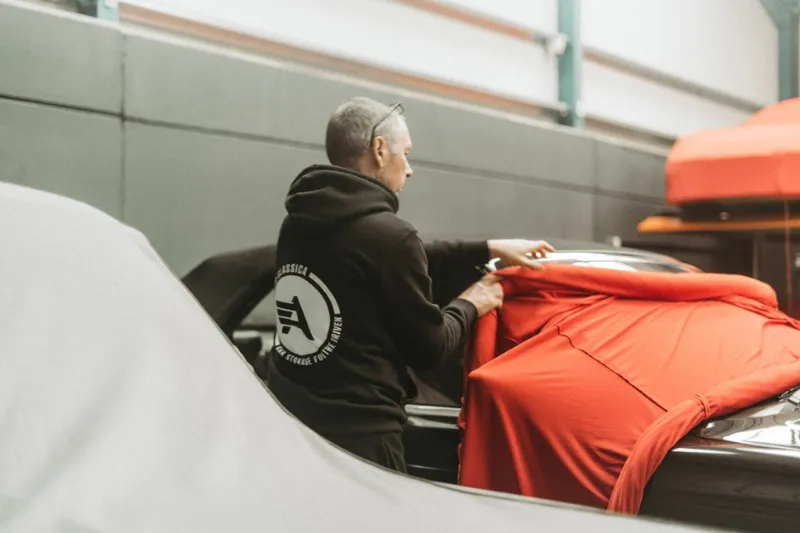
Hybrids and EVs: winter storage done right
EVs and many hybrids are happy to sit if you follow manufacturer guidance. In practice that means:
- Store at a moderate state of charge rather than 100 percent.
- Maintain the 12-volt system in line with the brand’s advice.
- Disable background features that wake the car or drain the battery.
- Keep the car clean, dry and dehumidified like any other.
- Plan occasional moves on dry, salt-free days if you intend to exercise the car.
If you are unsure about a specific model, we will check the handbook and agree a routine with you before the car arrives.
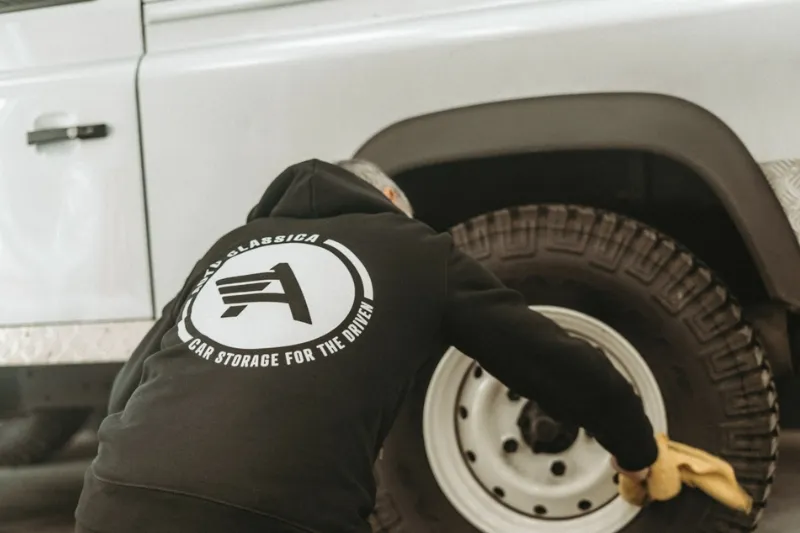
Occasional winter drives vs full lay-up
Some owners like a clear, dry Sunday run to keep everything moving. Others prefer to leave the car untouched until spring. Both approaches work if you plan them:
- Occasional drives. Watch the forecast, avoid salty roads, and book access so we can warm the car area, unplug the conditioner, set tyre pressures and have the car ready. When you return, we will rinse salt if needed, dry the car and reconnect everything.
- Full lay-up. No “start and stop” idling. That creates moisture and fuel dilution. Instead, rely on the conditioner, movement schedule and dehumidified environment. Your car will be better for it.
Local convenience in winter
Auto Classica’s facility near Milton Keynes is within easy reach of London and the Home Counties. That matters in winter, when weather windows are short and roads can be grimy for days after gritting. We can schedule covered transport, arrange airport hand-offs, and work around your calendar so the car leaves and returns clean and dry.
See our locations:
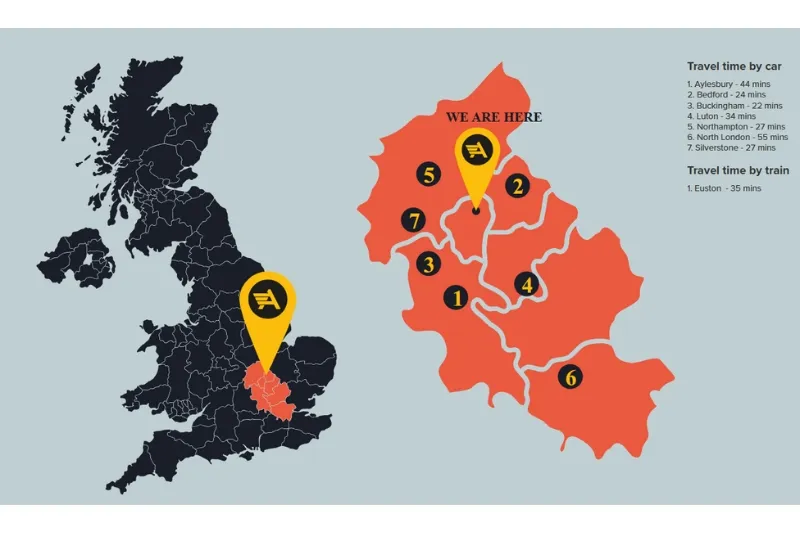
Where this fits with our other guides
- Need the simple, sales-led overview and a fast quote? Head to the service page: Winter Car Storage
- Looking after an older vehicle? See: Store a classic car over winter
- Want the full technical background on why humidity matters? Read: Dehumidified Car Storage
- Curious about flat-spot prevention in detail? Start here: Tyre cushions for car storage
FAQs (winter-specific)
Why do batteries fail more often in winter, even in storage?
Cold reduces the chemical reaction inside a 12-volt battery, so there is less available power. Add alarm and tracker draw and the margin shrinks. A smart conditioner matched to the battery chemistry keeps the system healthy without overcharging.
Should I raise tyre pressures for winter storage or use tyre cushions?
Always set pressures first. If the car will sit for a long time on wide, soft tyres, tyre cushions help distribute load and reduce the chance of flat-spotting. We will recommend them based on the car, tyre and lay-up length.
How do I stop mould and condensation inside the car?
Start dry, store in a dehumidified environment, remove damp items, and avoid short cold starts in a damp garage. Breathable covers only, and only once the car is dry.
Is it safe to store a supercar or EV over winter without running it?
Yes. With the right battery maintenance, tyre routine and environment, a car can sit for months and be ready to drive when you are. For EVs and hybrids, follow the brand’s state-of-charge guidance and maintain the 12-volt system correctly.
What Auto Classica does for winter storage
- Dehumidified indoor bays with visible humidity readings.
- Documented battery routines for lead-acid, AGM and lithium systems.
- Tyre care: pressures set, movement schedule, tyre cushions on request.
- Salt-safe handovers: clean before lay-up and before return if needed.
- Discreet security: controlled access, CCTV, key handling with Faraday storage.
- Logistics: covered transport, airport hand-offs, flexible access around weather windows.

Ready to protect your car this winter?
Check our prices and availability or ask us to build a winter lay-up routine for your car.
.svg)


